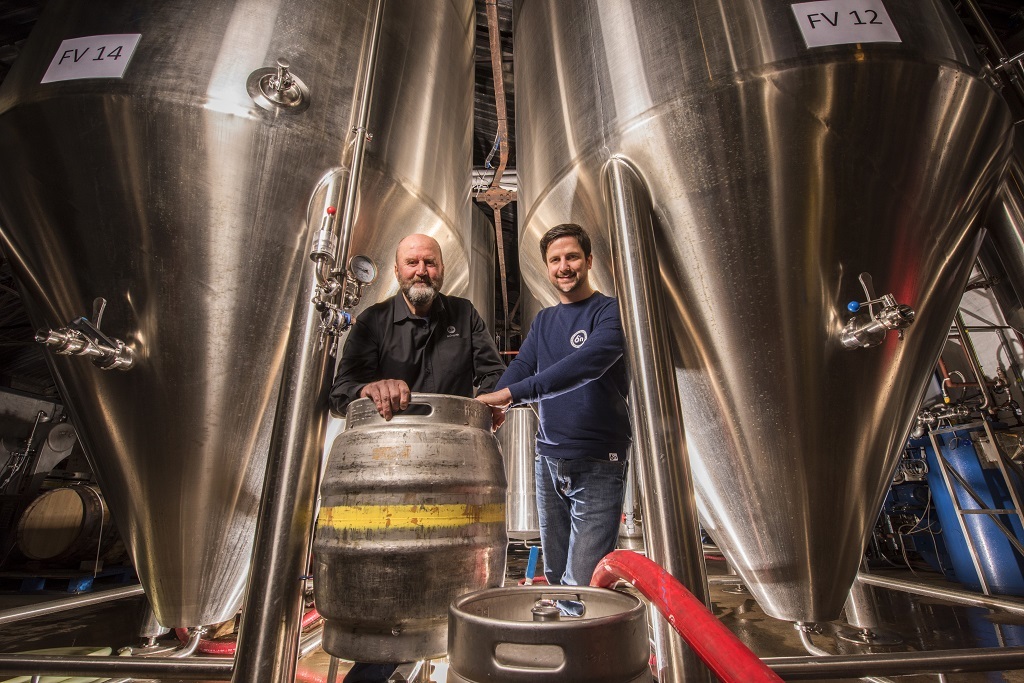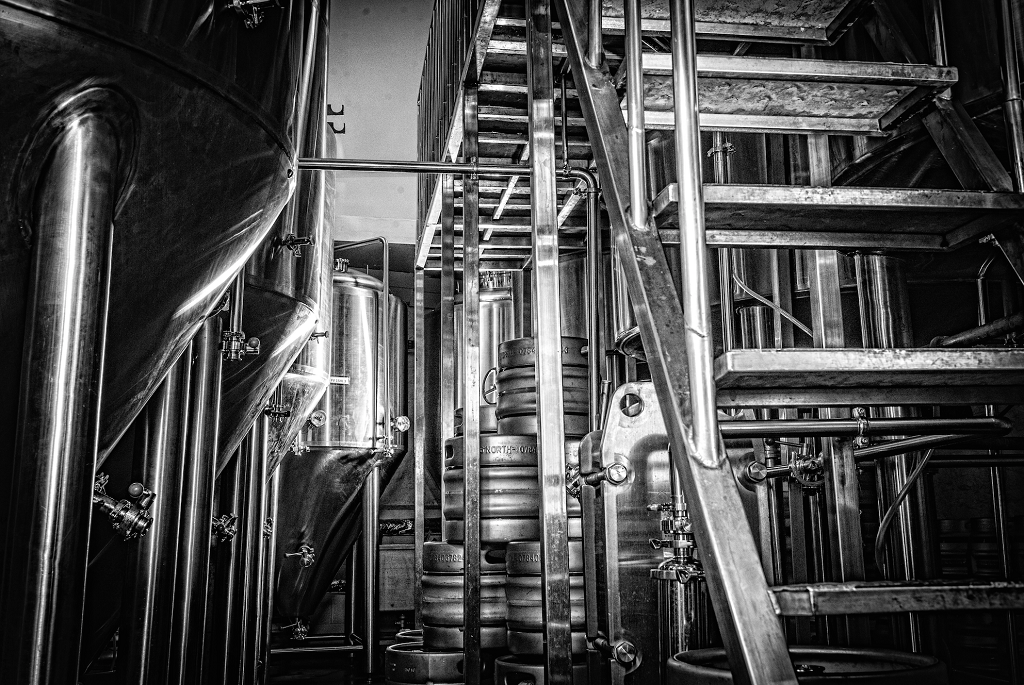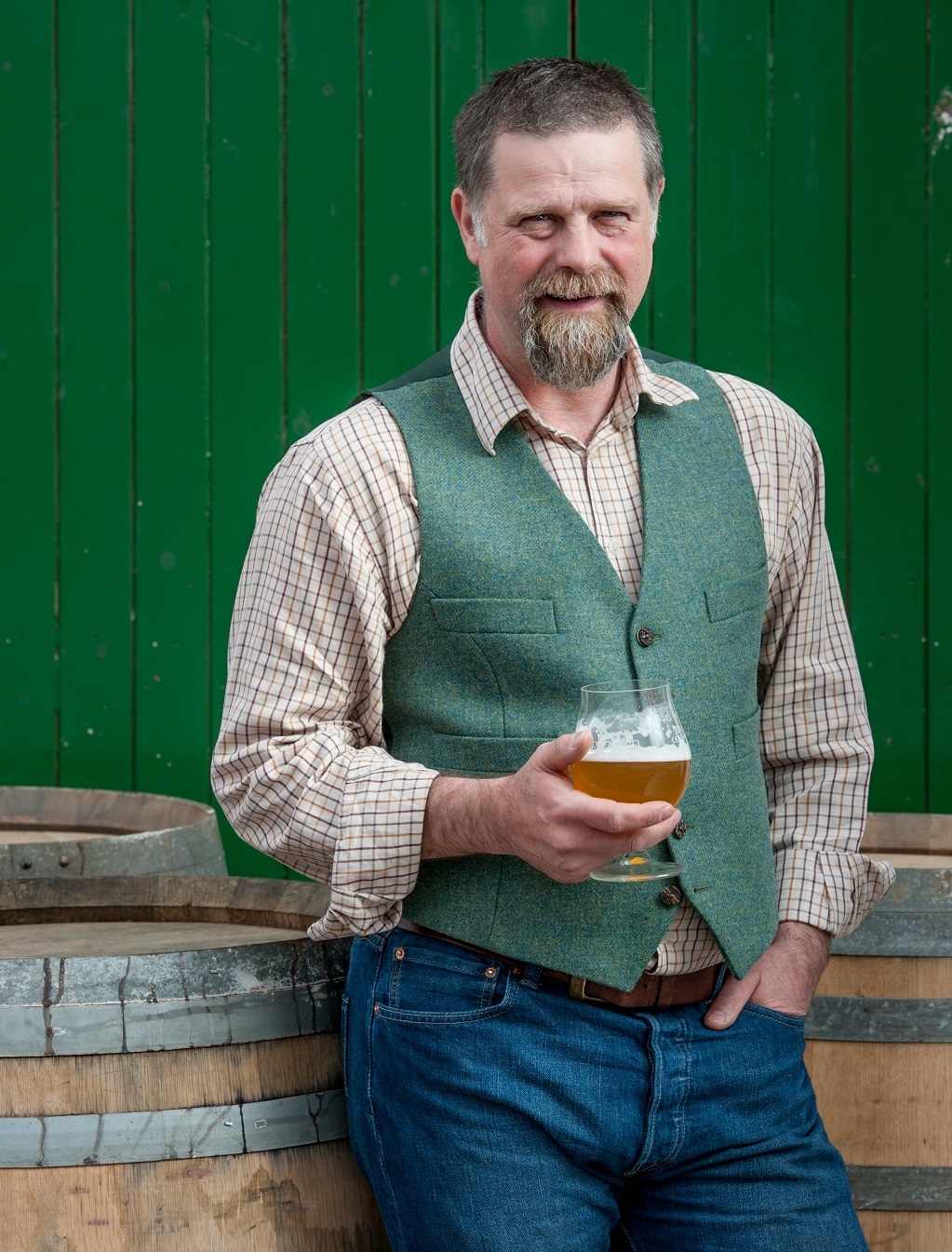
The joy of Six in a sleepy rural Scottish village
Tucked away in the sleepy farming village of Laurencekirk in Aberdeenshire is a small warehouse and attached pre-fab building which serve as the offices for Six Degrees North.
It may appear relatively ordinary, yet what goes on inside is anything but.
With a name inspired by its location – six degrees north of Brussels – the facility is one of Scotland’s most exciting craft beer breweries, specialising in Belgium-inspired beer. It was born out of founder Robert Lindsay’s love affair with Belgian beer, culture and tradition, and his realisation that there was a gap in the market.
‘A distinct lack of brewers making Belgian-style beers in the UK was something that partly inspired me to set up 6DN,’ he says.
Working in Brussels sparked Robert’s desire to bring the unique brewing style and ethos the Belgians are famous for to Scotland. ‘I was in the hospitality trade prior to setting up Six Degrees North,’ says Robert.

Denis Garden and Matt Carington at 6 Degrees North
‘Running a pub for several years provided me with a good grounding to move into brewing my own beers, as did undertaking a brewing course and work placements in various breweries in both the UK and Belgium.’
But when Robert had the idea for the brewery in the early 2000s, the banks weren’t keen on lending him money for the novel idea of craft brewing, so he had to go his own way. To fund his dream, Robert, or ‘BrewBob’ bought The Creel Inn in the tiny fishing village of Catterline, six miles south of Stonehaven and set about importing Belgian beer and ‘re-educating’ the locals.
In 2010, he purchased the Marine Hotel in Stonehaven and ran both this and The Creel Inn, operating 18 taps with all different kinds of beers. He later sold The Creel to cover the cost of building a brewery behind the Marine Hotel and by 2013 this was up and running. But it wasn’t all smooth sailing from there as head of sales, Denis Garden, recalls.

Inside Six Degrees North’s brewery
‘Shortly after the brewery was up and running, the opportunity came up to buy the first Six Degrees North bar in Aberdeen, maybe a bit quicker than expected. Once it was up and running, the problem was that the brewery was too small straight away,’ he says.
Although the Stonehaven location couldn’t meet demand for the new bar, the fledgling company didn’t have the funds to buy a new brewery so they moved into a rented site in Laurencekirk, allowing them to increase their brewing capacity by 75,000 cases per year, amounting to a total of 5,000 hectolitres per annum, or 1.5 million bottles.
Despite teething problems, the company’s unique products helped them weather the storm. Priding themselves on their purist approach to the production process, Six Degrees North uses the area’s soft water – similar to that available in Belgium – and high quality barley to create beers which are unfiltered and carbonated naturally through secondary fermentation.
Nothing is added or taken away during the process and a batch is only bottled once it’s perfect. This can lead to some astronomically long brew times, with one of their experimental beers taking 20 weeks, compared to an average of two weeks for most craft beers.

The finished product at Six Degrees North
Most of their flagship beers are inspired by products from Belgium, such as the Hop Classic, the first beer ever produced by Six Degrees North. It’s a homage to the famous De Ranke XX Bitter, often referred to as Belgium’s bitterest beer.
In the UK’s burgeoning craft beer market, which saw the number of breweries rocket by 18% in 2016, Six Degrees North has kept themselves relevant by collaborating with other breweries to spark creativity and innovation.
The ‘Advancement Through Collaboration’ (ATC) range has seen the creation of a number of innovative products such as the A6 Imperial Stout, produced through a partnership with Suffolk-based Adnams. The beer, which was triple fermented with different yeasts and aged in Spirit of Broadside casks, has proved to be a massive hit, and there are plans to produce another batch in the near future.
‘The ATC range allows us to showcase more modern styles with breweries like Cloudwater, which specialises in seasonal beers and ingredients, and Magic Rock, which specialises in colourful and big flavour beers. We are trying to do one collaboration a month,’ says head of design, Matt Carrington.
‘We’re making beers with them, which is showcasing real, modern styles whilst having that Belgian influence as well. It’s an exchange of ideas and you come away often having learnt about new processes, hops and ingredients.’
The other advantage of these collaborations is the exposure they offer in terms of new customers and markets for the brewery. One of the most unusual and experimental set of collaborations they have done is their Foraged and Found range, utilising ingredients such as heather and gorse picked close to the Laurencekirk premises.

The beers struck a chord with customers for their experimental flavours and sustainable merits, leading the brewery to double production for the next set in the range, due to be released this year. One partner involved in the Foraged and Found project was Swedish outfit Beerbliotek.
Following the success of the beer, Six Degrees North has been invited over to brew in Sweden and potentially get their products distributed there. These partnerships offer a means of networking for breweries such as Six Degrees North and have provided a path forward in the face of increased competition.
The company have also managed to expand in a short space of time, with the success of the Aberdeen bar paving the way for two more bars to open in 2016 – one on Glasgow’s Dumbarton Road and the other on Howe Street, Edinburgh.
Reflecting the style of bars in Belgium that Robert frequented during his time there, they have stripped back, simple interiors, with Six Degrees North signature beers and a Belgian food menu.
2018 has seen Six Degrees North’s busiest start to a year yet, with a new website launch and ten new collaborations confirmed for the year ahead, including a mixed fermentation pale ale with London brewers, Fullers. The team are also looking forward to showcasing their products in June at Stonehaven’s beer festival, Midsummer Beer Happening.
The most game-changing development for this year however, is the launch of a brand new, all-singing, all-dancing brewery and visitor centre in a large site in Aberdeenshire, with the location to be revealed in due course.
‘That’s the next stage of our progression and once it’s up and running we’ll decide what’s next!’ says Denis.
TAGS

